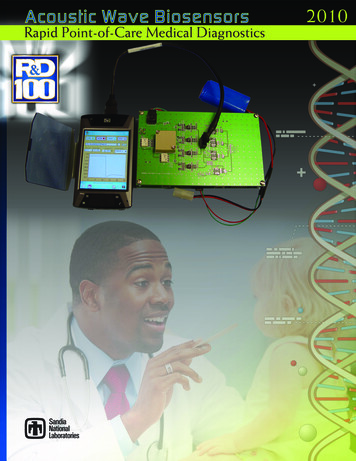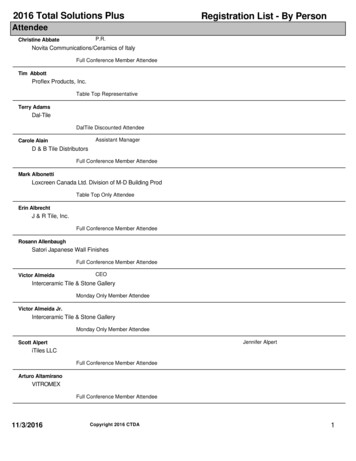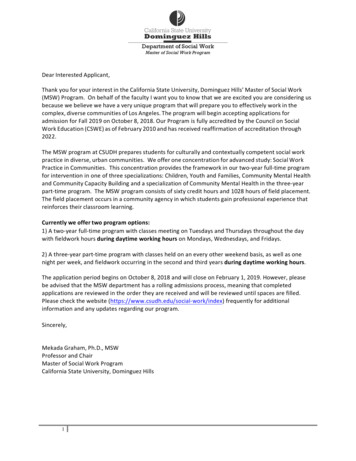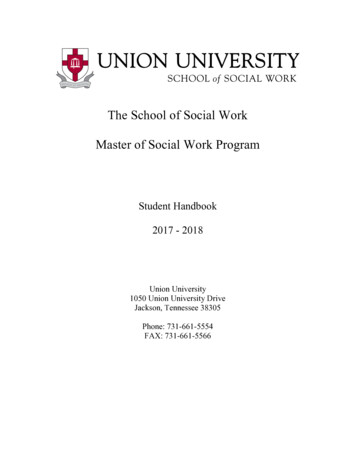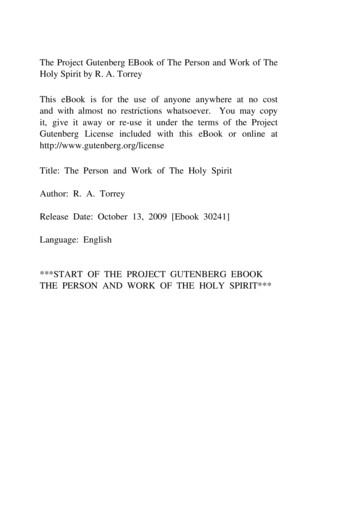
Transcription
The Project Gutenberg EBook of The Person and Work of TheHoly Spirit by R. A. TorreyThis eBook is for the use of anyone anywhere at no costand with almost no restrictions whatsoever. You may copyit, give it away or re-use it under the terms of the ProjectGutenberg License included with this eBook or online athttp://www.gutenberg.org/licenseTitle: The Person and Work of The Holy SpiritAuthor: R. A. TorreyRelease Date: October 13, 2009 [Ebook 30241]Language: English***START OF THE PROJECT GUTENBERG EBOOKTHE PERSON AND WORK OF THE HOLY SPIRIT***
The Person and WorkofThe Holy SpiritAs Revealed in the ScripturesAnd in Personal ExperienceByR. A. TorreyFleming H. Revell CompanyNew York, Chicago, Toronto,London and EdinburghCopyright 1910, byR. A. Torrey
ContentsChapter I. The Personality of the Holy Spirit. . . . . . . . 2Chapter II. The Deity of the Holy Spirit. . . . . . . . . . . 16Chapter III. The Distinction of the Holy Spirit from theFather and from His Son, Jesus Christ. . . . . . . . . . 22Chapter IV. The Subordination of the Spirit to the Fatherand to the Son. . . . . . . . . . . . . . . . . . . . . . . 24Chapter V. The Person and Work of the Holy Spirit asRevealed in His Names. . . . . . . . . . . . . . . . . . 26Chapter VI. The Work of the Holy Spirit in the MaterialUniverse. . . . . . . . . . . . . . . . . . . . . . . . . 55Chapter VII. The Holy Spirit Convicting the World of Sin,of Righteousness and of Judgment. . . . . . . . . . . . 58Chapter VIII. The Holy Spirit Bearing Witness to JesusChrist. . . . . . . . . . . . . . . . . . . . . . . . . . . 68Chapter IX. The Regenerating Work of the Holy Spirit. . . 73Chapter X. The Indwelling Spirit Fully and Forever Satisfying. . . . . . . . . . . . . . . . . . . . . . . . . . . 80Chapter XI. The Holy Spirit Setting the Believer FreeFrom the Power of Indwelling Sin. . . . . . . . . . . . 85Chapter XII. The Holy Spirit Forming Christ Within Us. . 90Chapter XIII. The Holy Spirit Bringing Forth in the Believer Christlike Graces of Character. . . . . . . . . . . 94Chapter XIV. The Holy Spirit Guiding the Believer Into aLife as a Son. . . . . . . . . . . . . . . . . . . . . . . 97Chapter XV. The Holy Spirit Bearing Witness to our Sonship.101Chapter XVI. The Holy Spirit as a Teacher. . . . . . . . . 105Chapter XVII. Praying, Returning Thanks, Worshippingin the Holy Spirit. . . . . . . . . . . . . . . . . . . . . 114
ivThe Person and Work of The Holy SpiritChapter XVIII. The Holy Spirit Sending Men Forth toDefinite Lines of Work. . . . . . . . . . . . . . . . . .Chapter XIX. The Holy Spirit and the Believer's Body. . .Chapter XX. The Baptism With the Holy Spirit. . . . . . .Chapter XXI. The Work of the Holy Spirit in Prophets andApostles. . . . . . . . . . . . . . . . . . . . . . . . . .Chapter XXII. The Work of the Holy Spirit In Jesus Christ.Footnotes . . . . . . . . . . . . . . . . . . . . . . . . . .119127129187195199
[007]
Chapter I. The Personality of theHoly Spirit.[008]Before one can correctly understand the work of the Holy Spirit,he must first of all know the Spirit Himself. A frequent sourceof error and fanaticism about the work of the Holy Spirit is theattempt to study and understand His work without first of allcoming to know Him as a Person.It is of the highest importance from the standpoint of worshipthat we decide whether the Holy Spirit is a Divine Person,worthy to receive our adoration, our faith, our love, and ourentire surrender to Himself, or whether it is simply an influenceemanating from God or a power or an illumination that Godimparts to us. If the Holy Spirit is a person, and a Divine Person,and we do not know Him as such, then we are robbing a DivineBeing of the worship and the faith and the love and the surrenderto Himself which are His due.It is also of the highest importance from the practical standpointthat we decide whether the Holy Spirit is merely some mysteriousand wonderful power that we in our weakness and ignorance aresomehow to get hold of and use, or whether the Holy Spirit is areal Person, infinitely holy, infinitely wise, infinitely mighty andinfinitely tender who is to get hold of and use us. The formerconception is utterly heathenish, not essentially different fromthe thought of the African fetich worshipper who has his godwhom he uses. The latter conception is sublime and Christian. Ifwe think of the Holy Spirit as so many do as merely a power orinfluence, our constant thought will be, “How can I get more ofthe Holy Spirit,” but if we think of Him in the Biblical way asa Divine Person, our thought will rather be, “How can the Holy
Chapter I. The Personality of the Holy Spirit.3Spirit have more of me?” The conception of the Holy Spirit asa Divine influence or power that we are somehow to get hold ofand use, leads to self-exaltation and self-sufficiency. One whoso thinks of the Holy Spirit and who at the same time imaginesthat he has received the Holy Spirit will almost inevitably befull of spiritual pride and strut about as if he belonged to somesuperior order of Christians. One frequently hears such personssay, “I am a Holy Ghost man,” or “I am a Holy Ghost woman.”But if we once grasp the thought that the Holy Spirit is a DivinePerson of infinite majesty, glory and holiness and power, whoin marvellous condescension has come into our hearts to makeHis abode there and take possession of our lives and make useof them, it will put us in the dust and keep us in the dust. I canthink of no thought more humbling or more overwhelming thanthe thought that a person of Divine majesty and glory dwells inmy heart and is ready to use even me.It is of the highest importance from the standpoint ofexperience that we know the Holy Spirit as a person. Thousandsand tens of thousands of men and women can testify to theblessing that has come into their own lives as they have cometo know the Holy Spirit, not merely as a gracious influence(emanating, it is true, from God) but as a real Person, just asreal as Jesus Christ Himself, an ever-present, loving Friend andmighty Helper, who is not only always by their side but dwells intheir heart every day and every hour and who is ready to undertakefor them in every emergency of life. Thousands of ministers,Christian workers and Christians in the humblest spheres oflife have spoken to me, or written to me, of the completetransformation of their Christian experience that came to themwhen they grasped the thought (not merely in a theological, butin an experimental way) that the Holy Spirit was a Person andconsequently came to know Him.There are at least four distinct lines of proof in the Bible thatthe Holy Spirit is a person.[009]
4[010][011]The Person and Work of The Holy SpiritI. All the distinctive characteristics of personality are ascribedto the Holy Spirit in the Bible.What are the distinctive characteristics, or marks, ofpersonality? Knowledge, feeling or emotion, and will. Anyentity that thinks and feels and wills is a person. When we saythat the Holy Spirit is a person, there are those who understandus to mean that the Holy Spirit has hands and feet and eyes andears and mouth, and so on, but these are not the characteristicsof personality but of corporeity. All of these characteristics ormarks of personality are repeatedly ascribed to the Holy Spiritin the Old and New Testaments. We read in 1 Cor. ii. 10, 11,“But God hath revealed them unto us by His Spirit: for the Spiritsearcheth all things, yea, the deep things of God. For what manknoweth the things of a man, save the spirit of man which is inhim? even so the things of God knoweth no man, but the Spiritof God.” Here knowledge is ascribed to the Holy Spirit. We areclearly taught that the Holy Spirit is not merely an influence thatilluminates our minds to comprehend the truth but a Being whoHimself knows the truth.In 1 Cor. xii. 11, we read, “But all these worketh that one andthe selfsame Spirit, dividing to every man severally as He will.”Here will is ascribed to the Spirit and we are taught that the HolySpirit is not a power that we get hold of and use according to ourwill but a Person of sovereign majesty, who uses us accordingto His will. This distinction is of fundamental importance inour getting into right relations with the Holy Spirit. It is at thisvery point that many honest seekers after power and efficiencyin service go astray. They are reaching out after and struggling toget possession of some mysterious and mighty power that theycan make use of in their work according to their own will. Theywill never get possession of the power they seek until they cometo recognize that there is not some Divine power for them to gethold of and use in their blindness and ignorance but that thereis a Person, infinitely wise, as well as infinitely mighty, who is
Chapter I. The Personality of the Holy Spirit.5willing to take possession of them and use them according to Hisown perfect will. When we stop to think of it, we must rejoicethat there is no Divine power that beings so ignorant as we are,so liable to err, to get hold of and use. How appalling might bethe results if there were. But what a holy joy must come into ourhearts when we grasp the thought that there is a Divine Person,One who never errs, who is willing to take possession of us andimpart to us such gifts as He sees best and to use us according toHis wise and loving will.We read in Rom. viii. 27, “And He that searcheth the heartsknoweth what is the mind of the Spirit, because He makethintercession for the saints according to the will of God.” In thispassage mind is ascribed to the Holy Spirit. The Greek wordtranslated “mind” is a comprehensive word, including the ideasof thought, feeling and purpose. It is the same that is used inRom. viii. 7 where we read that “the carnal mind is enmityagainst God: for it is not subject to the law of God, neither indeedcan be.” So then in this passage we have all the distinctive marksof personality ascribed to the Holy Spirit.We find the personality of the Holy Spirit brought out in amost touching and suggestive way in Rom. xv. 30, “Now Ibeseech you, brethren, for the Lord Jesus Christ's sake, and forthe love of the Spirit, that ye strive together with me in yourprayers to God for me.” Here we have “love” ascribed to theHoly Spirit. The reader would do well to stop and ponder thosefive words, “the love of the Spirit.” We dwell often upon thelove of God the Father. It is the subject of our daily and constantthought. We dwell often upon the love of Jesus Christ the Son.Who would think of calling himself a Christian who passed aday without meditating on the love of his Saviour, but how oftenhave we meditated upon “the love of the Spirit”? Each day ofour lives, if we are living as Christians ought, we kneel downin the presence of God the Father and look up into His face andsay, “I thank Thee, Father, for Thy great love that led Thee to[012]
6[013]The Person and Work of The Holy Spiritgive Thine only begotten Son to die upon the cross of Calvaryfor me.” Each day of our lives we also look up into the face ofour Lord and Saviour, Jesus Christ, and say, “Oh, Thou gloriousLord and Saviour, Jesus Thou Son of God, I thank Thee for Thygreat love that led Thee not to count it a thing to be grasped to beon equality with God but to empty Thyself and forsaking all theglory of heaven, come down to earth with all its shame and totake my sins upon Thyself and die in my place upon the cross ofCalvary.” But how often do we kneel and say to the Holy Spirit,“Oh, Thou eternal and infinite Spirit of God, I thank Thee forThy great love that led Thee to come into this world of sin anddarkness and to seek me out and to follow me so patiently untilThou didst bring me to see my utter ruin and need of a Saviourand to reveal to me my Lord and Saviour, Jesus Christ, as just theSaviour whom I need.” Yet we owe our salvation just as truly tothe love of the Spirit as we do to the love of the Father and thelove of the Son. If it had not been for the love of God the Fatherlooking down upon me in my utter ruin and providing a perfectatonement for me in the death of His own Son on the cross ofCalvary, I would have been in hell to-day. If it had not beenfor the love of Jesus Christ, the eternal Word of God, lookingupon me in my utter ruin and in obedience to the Father, puttingaside all the glory of heaven for all the shame of earth and takingmy place, the place of the curse, upon the cross of Calvary andpouring out His life utterly for me, I would have been in hellto-day. But if it had not been for the love of the Holy Spirit, sentby the Father in answer to the prayer of the Son (John xiv. 16)leading Him to seek me out in my utter blindness and ruin andto follow me day after day, week after week, and year after year,when I persistently turned a deaf ear to His pleadings, followingme through paths of sin where it must have been agony for thatholy One to go, until at last I listened and He opened my eyesto see my utter ruin and then revealed Jesus to me as just theSaviour that would meet my every need and then enabled me to
Chapter I. The Personality of the Holy Spirit.7receive this Jesus as my own Saviour; if it had not been for thispatient, long-suffering, never-tiring, infinitely-tender love of theHoly Spirit, I would have been in hell to-day. Oh, the Holy Spiritis not merely an influence or a power or an illumination but is aPerson just as real as God the Father or Jesus Christ His Son.The personality of the Holy Spirit comes out in the OldTestament as truly as in the New, for we read in Neh. ix.20, “Thou gavest also Thy good Spirit to instruct them, andwithheldest not Thy manna from their mouth, and gavest themwater for their thirst.” Here both intelligence and goodness areascribed to the Holy Spirit. There are some who tell us thatwhile it is true the personality of the Holy Spirit is found in theNew Testament, it is not found in the Old. But it is certainlyfound in this passage. As a matter of course, the doctrine of thepersonality of the Holy Spirit is not as fully developed in the OldTestament as in the New. But the doctrine is there.There is perhaps no passage in the entire Bible in whichthe personality of the Holy Spirit comes out more tenderly andtouchingly than in Eph. iv. 30, “And grieve not the Holy Spiritof God, whereby ye are sealed unto the day of redemption.” Heregrief is ascribed to the Holy Spirit. The Holy Spirit is not ablind, impersonal influence or power that comes into our lives toilluminate, sanctify and empower them. No, He is immeasurablymore than that, He is a holy Person who comes to dwell in ourhearts, One who sees clearly every act we perform, every wordwe speak, every thought we entertain, even the most fleetingfancy that is allowed to pass through our minds; and if there isanything in act, or word or deed that is impure, unholy, unkind,selfish, mean, petty or untrue, this infinitely holy One is deeplygrieved by it. I know of no thought that will help one more thanthis to lead a holy life and to walk softly in the presence of theholy One. How often a young man is kept back from yieldingto the temptations that surround young manhood by the thoughtthat if he should yield to the temptation that now assails him, his[014][015]
8[016]The Person and Work of The Holy Spiritholy mother might hear of it and would be grieved by it beyondexpression. How often some young man has had his hand uponthe door of some place of sin that he is about to enter and thethought has come to him, “If I should enter there, my mothermight hear of it and it would nearly kill her,” and he has turnedhis back upon that door and gone away to lead a pure life, thathe might not grieve his mother. But there is One who is holierthan any mother, One who is more sensitive against sin than thepurest woman who ever walked this earth, and who loves us aseven no mother ever loved, and this One dwells in our hearts, ifwe are really Christians, and He sees every act we do by day orunder cover of the night; He hears every word we utter in publicor in private; He sees every thought we entertain, He beholdsevery fancy and imagination that is permitted even a momentarylodgment in our mind, and if there is anything unholy, impure,selfish, mean, petty, unkind, harsh, unjust, or in anywise evilin act or word or thought or fancy, He is grieved by it. If wewill allow those words, “Grieve not the Holy Spirit of God,” tosink into our hearts and become the motto of our lives, they willkeep us from many a sin. How often some thought or fancy hasknocked for an entrance into my own mind and was about to findentertainment when the thought has come, “The Holy Spirit seesthat thought and will be grieved by it” and that thought has gone.II. Many acts that only a Person can perform are ascribed tothe Holy Spirit.If we deny the personality of the Holy Spirit, many passagesof Scripture become meaningless and absurd. For example, weread in 1 Cor. ii. 10, “But God hath revealed them unto us by HisSpirit: for the Spirit searcheth all things, yea, the deep things ofGod.” This passage sets before us the Holy Spirit, not merely asan illumination whereby we are enabled to grasp the deep thingsof God, but a Person who Himself searches the deep things ofGod and then reveals to us the precious discoveries which Hehas made.
Chapter I. The Personality of the Holy Spirit.9We read in Rev. ii. 7, “He that hath an ear, let him hear whatthe Spirit saith unto the churches; To him that overcometh will Igive to eat of the tree of life, which is in the midst of the paradiseof God.” Here the Holy Spirit is set before us, not merely as animpersonal enlightenment that comes to our mind but a Personwho speaks and out of the depths of His own wisdom, whispersinto the ear of His listening servant the precious truth of God.In Gal. iv. 6 we read, “And because ye are sons, God hathsent forth the Spirit of His Son into your hearts, crying, Abba,Father.” Here the Holy Spirit is represented as crying out in theheart of the individual believer. Not merely a Divine influenceproducing in our own hearts the assurance of our sonship but onewho cries out in our hearts, who bears witness together with ourspirit that we are sons of God. (See also Rom. viii. 16.)The Holy Spirit is also represented in the Scripture as onewho prays. We read in Rom. viii. 26, R. V., “And in like mannerthe Spirit also helpeth our infirmity; for we know not how topray as we ought; but the Spirit Himself maketh intercession forus with groanings which cannot be uttered.” It is plain from thispassage that the Holy Spirit is not merely an influence that movesus to pray, not merely an illumination that teaches us how topray, but a Person who Himself prays in and through us. Thereis wondrous comfort in the thought that every true believer hastwo Divine Persons praying for him, Jesus Christ, the Son whowas once upon this earth, who knows all about our temptations,who can be touched with the feeling of our infirmities and whois now ascended to the right hand of the Father and in that placeof authority and power ever lives to make intercession for us(Heb. vii. 25; 1 John ii. 1); and another Person, just as Divineas He, who walks by our side each day, yes, who dwells in theinnermost depths of our being and knows our needs, even aswe do not know them ourselves, and from these depths makesintercession to the Father for us. The position of the believeris indeed one of perfect security with these two Divine Persons[017]
10[018][019]The Person and Work of The Holy Spiritpraying for him.We read again in John xv. 26, “But when the Comforter iscome, whom I will send unto you from the Father, even theSpirit of truth, which proceedeth from the Father, He shall testifyof Me.” Here the Holy Spirit is set before us as a Person whogives His testimony to Jesus Christ, not merely as an illuminationthat enables the believer to testify of Christ, but a Person whoHimself testifies; and a clear distinction is drawn in this and thefollowing verse between the testimony of the Holy Spirit and thetestimony of the believer to whom He has borne His witness,for we read in the next verse, “And ye also shall bear witnessbecause ye have been with Me from the beginning.” So there aretwo witnesses, the Holy Spirit bearing witness to the believerand the believer bearing witness to the world.The Holy Spirit is also spoken of as a teacher. We read in Johnxiv. 26, “But the Comforter, which is the Holy Ghost, whom theFather will send in My name, He shall teach you all things, andbring all things to your remembrance, whatsoever I have saidunto you.” And in a similar way, we read in John xvi. 12-14, “Ihave yet many things to say unto you, but ye cannot bear themnow. Howbeit when He, the Spirit of truth, is come, He willguide you into all truth: for He shall not speak of Himself; butwhatsoever He shall hear, that shall He speak: and He will showyou things to come. He shall glorify Me: for He shall receive ofMine, and shall show it unto you.” And in the Old Testament,Neh. ix. 20, “Thou gavest also Thy good Spirit to instruct them.”In all these passages it is perfectly clear that the Holy Spirit isnot a mere illumination that enables us to apprehend the truth,but a Person who comes to us to teach us day by day the truth ofGod. It is the privilege of the humblest believer in Jesus Christnot merely to have his mind illumined to comprehend the truthof God, but to have a Divine Teacher to daily teach him the truthhe needs to know (cf. 1 John ii. 20, 27). The Holy Spirit is alsorepresented as the Leader and Guide of the children of God. We
Chapter I. The Personality of the Holy Spirit.11read in Rom. viii. 14, “For as many as are led by the Spirit ofGod they are the sons of God.” He is not merely an influence thatenables us to see the way that God would have us go, nor merelya power that gives us strength to go that way, but a Person whotakes us by the hand and gently leads us on in the paths in whichGod would have us walk.The Holy Spirit is also represented as a Person who hasauthority to command men in their service of Jesus Christ. Weread of the Apostle Paul and his companions in Acts xvi. 6, 7,“Now when they had gone throughout Phrygia and the regionof Galatia, and were forbidden of the Holy Ghost to preach theWord in Asia, after they were come to Mysia, they assayed togo into Bithynia: but the Spirit suffered them not.” Here it is aPerson who takes the direction of the conduct of Paul and hiscompanions and a Person whose authority they recognized andto whom they instantly submit.Further still than this the Holy Spirit is represented as the Onewho is the supreme authority in the church, who calls men towork and appoints them to office. We read in Acts xiii. 2, “Asthey ministered to the Lord, and fasted, the Holy Ghost said,Separate Me Barnabas and Saul for the work where unto I havecalled them.” And in Acts xx. 28, “Take heed therefore untoyourselves, and to all the flock, over the which the Holy Ghosthath made you overseers, to feed the Church of God, which Hehath purchased with His own blood.” There can be no doubt toa candid seeker after truth that it is a Person, and a person ofDivine majesty and sovereignty, who is here set before us.From all the passages here quoted, it is evident that many actsthat only a person can perform are ascribed to the Holy Spirit.III. An office is predicated of the Holy Spirit that can only bepredicated of a person.Our Saviour says in John xiv. 16, 17, “And I will pray theFather, and He shall give you another Comforter, that He mayabide with you forever; Even the Spirit of truth: whom the world[020]
12[021]The Person and Work of The Holy Spiritcannot receive, because it seeth Him not, neither knoweth Him:but ye know Him; for He dwelleth with you, and shall be inyou.” Our Lord had announced to the disciples that He was aboutto leave them. An awful sense of desolation took possession ofthem. Sorrow filled their hearts (John xvi. 6) at the contemplationof their loneliness and absolute helplessness when Jesus shouldthus leave them alone. To comfort them the Lord tells them thatthey shall not be left alone, that in leaving them He was goingto the Father and that He would pray the Father and He wouldgive them another Comforter to take the place of Himself duringHis absence. Is it possible that Jesus Christ could have used suchlanguage if the other Comforter who was coming to take Hisplace was only an impersonal influence or power? Still more, isit possible that Jesus could have said as He did in John xvi. 7,“Nevertheless I tell you the truth: It is expedient for you that Igo away: for if I go not away, the Comforter will not come untoyou; but if I depart, I will send Him unto you,” if this Comforterwhom He was to send was simply an impersonal influence orpower? No, one Divine Person was going, another Person justas Divine was coming to take His place, and it was expedient forthe disciples that the One go to represent them before the Father,for another just as Divine and sufficient was coming to take Hisplace. This promise of our Lord and Saviour of the coming ofthe other Comforter and of His abiding with us is the greatestand best of all for the present dispensation. This is the promiseof the Father (Acts i. 4), the promise of promises. We shall takeit up again when we come to study the names of the Holy Spirit.IV. A treatment is predicated to the Holy Spirit that could onlybe predicated of a Person.We read in Isa. lxiii. 10, R. V., “But they rebelled andgrieved His Holy Spirit: therefore He was turned to be theirenemy, and He fought against them.” Here we are told that theHoly Spirit is rebelled against and grieved (cf. Eph. iv. 30).Only a person can be rebelled against and only a person of
Chapter I. The Personality of the Holy Spirit.13authority. Only a person can be grieved. You cannot grieve amere influence or power. In Heb. x. 29, we read, “Of how muchsorer punishment, suppose ye, shall he be thought worthy, whohath trodden underfoot the Son of God, and hath counted theblood of the covenant, wherewith he was sanctified, an unholything, and hath done despite unto the Spirit of grace?” Herewe are told that the Holy Spirit is “done despite unto” (“treatedwith contumely”—Thayer's Greek-English Lexicon of the NewTestament). There is but one kind of entity in the universe thatcan be treated with contumely (or insulted) and that is a person.It is absurd to think of treating an influence or a power or anykind of being except a person with contumely. We read again inActs v. 3, “But Peter said, Ananias, why hath Satan filled thineheart to lie to the Holy Ghost, and to keep back part of the priceof the land?” Here we have the Holy Spirit represented as onewho can be lied to. One cannot lie to anything but a person.In Matt. xii. 31, 32, we read, “Wherefore I say unto you, Allmanner of sin and blasphemy shall be forgiven unto men: butthe blasphemy against the Holy Ghost shall not be forgiven untomen. And whosoever speaketh a word against the Son of man, itshall be forgiven him: but whosoever speaketh against the HolyGhost, it shall not be forgiven him, neither in this world, neitherin the world to come.” Here we are told that the Holy Spirit isblasphemed against. It is impossible to blaspheme anything buta person. If the Holy Spirit is not a person, it certainly cannot bea more serious and decisive sin to blaspheme Him than it is toblaspheme the Son of man, our Lord and Saviour, Jesus ChristHimself.Here then we have four distinctive and decisive lines of proofthat the Holy Spirit is a Person. Theoretically most of us believethis but do we, in our real thought of Him and in our practicalattitude towards Him treat Him as if He were indeed a Person?At the close of an address on the Personality of the Holy Spirit ata Bible conference some years ago, one who had been a church-[022][023]
14The Person and Work of The Holy Spiritmember many years, a member of one of the most orthodox ofour modern denominations, said to me, “I never thought of Itbefore as a Person.” Doubtless this Christian woman had oftensung:“Praise God from whom all blessings flow,Praise Him all creatures here below,Praise Him above, ye heavenly host,Praise Father, Son and Holy Ghost.”Doubtless she had often sung:“Glory be to the Father, and to the Son, and to the HolyGhost,As it was in the beginning, is now, and ever shall be,World without end, Amen.”[024]But it is one thing to sing words; it is quite another thing torealize the meaning of what we sing. If this Christian woman hadbeen questioned in regard to her doctrine, she would doubtlesshave said that she believed that there were three Persons inthe Godhead, Father, Son and Holy Spirit, but a theologicalconfession is one thing, a practical realization of the truth weconfess is quite another. So the question is altogether necessary,no matter how orthodox you may be in your creedal statements,Do you regard the Holy Spirit as indeed as real a Person asJesus Christ, as loving and wise and strong, as worthy of yourconfidence and love and surrender as Jesus Christ Himself? TheHoly Spirit came into this world to be to the disciples of ourLord after His departure, and to us, what Jesus Christ had been tothem during the days of His personal companionship with them(John xiv. 16, 17). Is He that to you? Do you know Him? Everyweek in your life you hear the apostolic benediction, “The graceof the Lord Jesus Christ and the love of God and the communionof the Holy Ghost be with you all” (2 Cor. xiii. 14), but while
Chapter I. The Personality of the Holy Spirit.15you hear it, do you take in the significance of it? Do you knowthe communion of the Holy Ghost? The fellowship of the HolyGhost? The partnership of the Holy Ghost? The comradeship ofthe Holy Ghost? The intimate personal friendship of the HolyGhost? Herein lies the whole secret of a real
Oct 13, 2009 · Title: The Person and Work of The Holy Spirit Author: R. A. Torrey Release Date: October 13, 2009 [Ebook 30241] Language: English ***START OF THE PROJECT GUTENBERG



